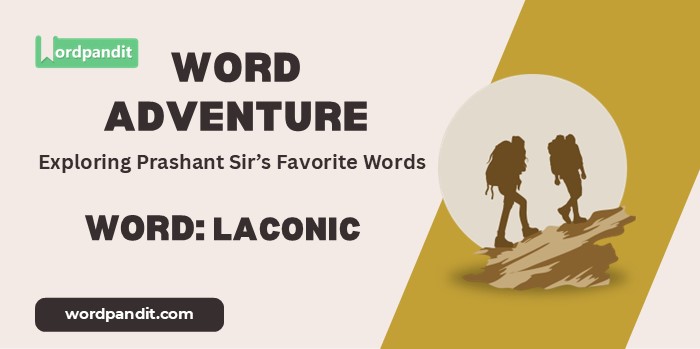Word Adventure: Laconic
The Headline
“Laconic: When Less Speaks Volumes”
The Scoop
In the vast realm of English vocabulary, some words carry centuries of history in their meaning. ‘Laconic’ is one such gem – a term that not only describes brevity but also pays homage to an ancient culture that elevated conciseness to an art form. Join me as we explore this powerful word that reminds us that sometimes, the fewer words used, the stronger the message.
Let’s Break It Down
The Plot Thickens
The story of ‘laconic’ takes us back to ancient Sparta, in the region of Laconia, Greece. The Spartans were renowned not just for their military prowess, but for their distinctive way of speaking – brief, direct, and often witty. This style of communication became so associated with the region that it gave birth to our word ‘laconic’.
Perhaps the most famous example of laconic wit comes from a historical exchange between Philip II of Macedon and Sparta. When Philip threatened, “If I enter Laconia, I will raze Sparta to the ground,” the Spartans replied with a single word: “If.” This response, embodying the perfect laconic style, effectively deterred Philip’s invasion.
Over time, ‘laconic’ has evolved to describe any communication that is concise and impactful, carrying the same spirit of powerful brevity that the Spartans mastered.
Word in the Wild
The Twist
Here’s an interesting paradox: while ‘laconic’ celebrates brevity, it often takes many words to explain why something is laconic! This irony highlights a deeper truth about communication – that sometimes we need to be verbose to appreciate brevity, just as we need silence to appreciate sound. In our age of information overload, the art of laconic expression becomes increasingly valuable.
Make It Stick
Laconic: When your words are few, but your impact is mighty!
Your Turn
Think about the most powerful laconic message you’ve ever encountered. Was it a response that left you speechless? A quote that stuck with you? Or perhaps a moment when few words carried enormous weight? Share your experiences with laconic communication in the comments below. Let’s explore how brevity can create lasting impressions!
Down the Rabbit Hole
- Curious about other terms for concise expression? Look into ‘terse’, ‘succinct’, or ‘pithy’.
- Interested in Spartan history and culture? Explore their military tactics, social structure, and philosophical outlook.
- Want to master the art of brevity? Study minimalist writing, haiku poetry, or the art of microfiction.
The Last Word
As we conclude our exploration of ‘laconic’, I hope you’ve gained appreciation for this word that celebrates the power of brevity. It reminds us that sometimes the most impactful messages come not from saying more, but from saying just enough. The next time you find yourself crafting a message, remember – you’re not just being brief, you’re being laconic! Until our next word adventure, this is Prashant from Wordpandit, encouraging you to make every word count!














